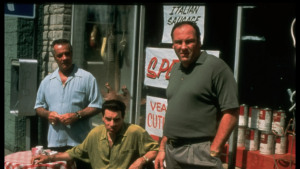
Celebrating its 25th anniversary this year, HBO’s landmark drama series The Sopranos remains the best and most influential crime drama in TV history. The series marked a monumental shift in the kinds of stories told on the small screen, including beloved protagonists doing unforgivable criminal acts while retaining their sympathetic humanity. However, if the stars didn’t align just right for series creator David Chase and HBO at the turn of the millennium, The Sopranos would look much different today.
For instance, The Sopranos was initially conceived as a feature film instead of a TV drama that lasted 7 seasons between 1999 and 2007. Stranger yet, the show was pitched to network television instead of a premium cable channel, which would have robbed the show of its iconic profane language and unforgettable violence had it been picked up. There’s also the crucial casting of Tony Soprano, which would look much different had the late great James Gandolfini not been cast as arguably TV’s greatest character.
The Sopranos Was Conceived as a Feature Film
The Sopranos is an organized crime drama created by David Chase, a veteran TV producer and writer behind such popular shows as The Rockford Files, Northern Exposure, Kolchak: The Night Stalker, and more. The story concerns the ultra-cool gangster Tony Soprano, a New Jersey mob boss and family man doing his best to balance his personal and professional lives.
By day, Tony fronts a construction and sanitation business. By night, Tony uses these illegal fronts to operate all sorts of criminal activity, including bookmaking, racketeering, stick-ups, drug dealing, and other sordid activity orchestrated from the backrooms of the Bada Bing strip club and Satriale’s Pork Store. To combat the escalating anxiety and existential unease of putting his family in danger, Tony undergoes therapy sessions with Dr. Jennifer Melfi (Lorraine Bracco).

Although the show will later be praised for its realistic cinematic approach, fans may be shocked to learn that The Sopranos was originally conceived as a feature film. According to The WGA, Chase envisioned The Sopranos as a feature-length crime comedy film about “a mobster having therapy problems with his mother.” Shown in the 2021 feature film prequel to The Sopranos, The Many Saints of Newark, Chase drew on his upbringing in New Jersey in the 1970s, focusing on the family fabric among ruthless criminals. The main point of conflict is Tony’s bitter relationship with his disapproving mother, Livia (Nancy Marchand), which Chase drew on from his childhood.
If a mafia film comedy about a mobster entering therapy sounds familiar, Harold Ramis’ 1999 feature Analyze This boasts the same premise. The comedy movie starring Robert De Niro and Billy Crystal became popular enough to warrant the 2002 sequel, Analyze That. Analyze This was released only three months after The Sopranos aired its pilot on HBO. However, despite the remarkable similar premises shared between the series and film, David Chase wrote the pilot after he signed a development deal with HBO in 1995 (per Vanity Fair). Therefore, the timing of The Sopranos and Analyze This was purely coincidental.
After consulting with his manager, Chase chose to adapt his feature film script for The Sopranos into a TV show. Once the pilot was written, Chase and his producer Brad Gray pitched the series to various networks. While it’s impossible to imagine The Sopranos living anywhere but HBO, Chase, and Gray took the pilot to Fox and the network expressed interest in producing the project. However, once Chase turned in the pilot script, Fox passed on the series and opened the door for HBO to swoop in.
While HBO exec Chris Albrecht deserves credit for taking a big risk with The Sopranos on HBO, the show would look much different had Fox decided to pick up the series and order a full season. Along with watershed TV series like The Wire, Oz, and Deadwood, The Sopranos elevates HBO programming to a new level of quality cinematic storytelling. Had the show aired on Fox, everything that made The Sopranos special would have been censored and butchered past recognition. The hyper-violence, the profane mafia slang, and the depiction of a complex protagonist who constantly lies, cheats, steals, and kills — yet remains a loving father working his problems out in therapy — would all cease to be on a safe family- friendly network like Fox.
